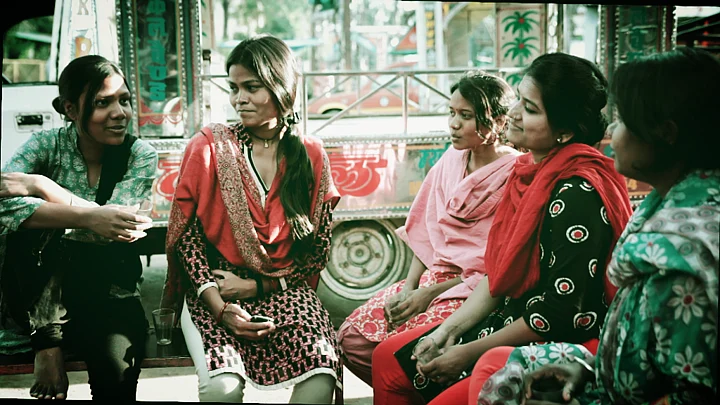Film: Turup
Director: Ektara Collective
Cast: Maulina Midde, Madhu Bhagat, Nidhi Qazi, Syed Saim Ali and others
Set against the backdrop of Bhopal’s Chakki Chouraha’s favourite pastime chess being played through the day, in between the daily chores of its residents, is the story of three women — Lata, Monika and Neelima. But these three women are never seen participating in the daily chess games and friendly matches — the game continues to be male-dominated.
Through the lives of these women which are inextricably intertwined, Turup seeks to explore the themes of gender-relations, communalism, casteism, and oppression.
An Egalitarian Film
The 72-minute-long feature film by the Bhopal-based Ektara Collective is crowd-funded and is unique in that it doesn’t credit its direction to any one person; rather, it claims to be directed by a collective.
Maheen Mirza, one of the screenplay writers of the film and an independent cinematographer explains to The Quint:
We had a team from amongst us who helped direct Turup. The idea was to take into consideration everyone’s (in the team) ideas while directing rather than making the whole process hierarchical. We have always been a collective.
The film is the brainchild of Mirza, (who is also a graduate from the Film and Television Institute of India), and Rinchin, a Chhattisgarh-based activist. It is evident through Turup’s women-centric narrative that its script and screenplay have been written by women, namely, Mirza and Rinchin.
Mirza told The Quint that the total budget of their film was Rs 2,00,364, which was collected from individuals who were allowed to contribute a total of Rs 5,000 each. “The finances were raised through individual contributions through word of mouth and emails,” says Mirza.
Turup’s three women protagonists are from different social backgrounds and have different occupations — Lata, is a young sweeper, Monika is an elderly household help and Neelima, Monika’s employer, is a middle-aged former journalist who is trying to make a comeback. However, they are bound by their common experience of feeling isolated and yet somehow manage to retain their sense of self.
In this Bhopal neighbourhood, we see undercurrents of communalism amid an otherwise peaceful setting when a young man, Majid, also joins the locals’ chess matches. He is at times otherised, and is also perceived as a threat, as, one man notes — Majid can not only win chess matches but can also win over “their” women. What makes Majid’s situation worse is that he is romantically involved with Lata, who is not from his religion or caste.
However, what stands out is Lata and Majid’s resolve to stand up to bigotry and parochialism; neither Majid nor Lata ever kowtow, and always hold their own.
In One's Own Skin
Caste tensions also pervade the film — an instance, which stands out, is that of Lata bitterly telling her brother, that the people who were so keen on getting her married are the same people who wouldn’t even drink a glass of water in their house.
Turup, while at one level is an exploration of caste-class-communal relations, it is also a film about women and their relationships with each other. When Neelima is frustrated with her marriage and her circumstances and is struggling to make a comeback with a powerful story, it is her household help Monika, who gives her that break.
This is possibly one of the most powerful scenes in the film, and also exemplifies the film’s attempt to shatter class barriers.
The Ektara Collective claims that many of the characters in the film were portrayed by non-actors. Among the chief protagonists, Monika (played by Maulina Midde) and Neelima (played by Nidhi Qazi) were acting for the first time.
According to Mirza, Maulina is as blunt and dry in real life as her on-screen character Monika. Some other actors in the film including Madhu Bhagat (Lata) had acted in street plays before but had never been mainstream actors. When asked about the non-actors involved with Turup, the Ektara Collective said in an email interview:
Many [...] were acting for the first time. In fact several people in the basti (slum) including Chakram dada (the local poet) were playing themselves.
In fact, the film’s crew claim that most dialogues were borrowed from real life conversations, which makes it easy to understand why the film is so very tangible — it is a montage of slices of life woven together with the lyrical thread of Kabir’s poetry.
Kabir’s poetry runs throughout the narrative, and is sung to folk music, which heightens the sentiments of Sufism and syncretism that the words stand for.
A Slice of Life
Very documentary-like, especially in terms of cinematography and the film’s inclusion of non-actors, Turup is a bold statement in an increasingly polarised world.
The film has not yet been released to the public, and was privately screened in Delhi recently by the non-profit “Kriti Film Club”, run by Aanchal Kapoor. The Ektara Collective hopes to make the film available to the public through online channels and a DVD-release later in the year. You can watch the trailer here:
Our Verdict: 4 Quints out of 5
